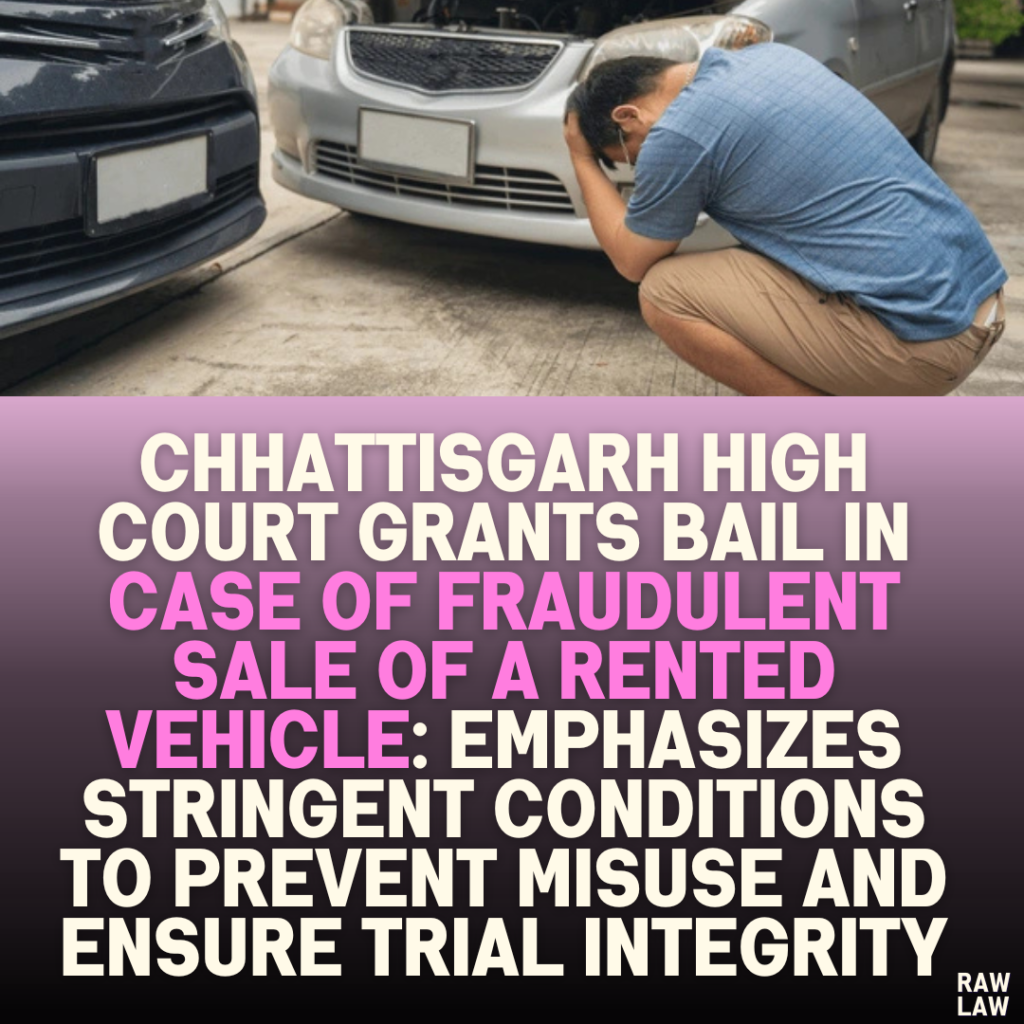Court’s Decision
The High Court of Chhattisgarh granted bail to the two accused individuals involved in a case concerning the fraudulent sale of a rented vehicle. The court considered the time spent in custody, the completion of the investigation, and the delay in trial proceedings as critical factors favoring bail. However, the court imposed strict conditions to ensure the trial’s integrity and prevent any misuse of bail liberty.
Facts
- A vehicle registered in the name of the complainant was rented out to one of the accused, Mohammad Anis, on behalf of CPL Private Limited, with a rental agreement of ₹26,000 per month.
- The accused paid the rent initially but later defaulted and failed to return the vehicle. Upon inquiries, the complainant discovered that the vehicle had been fraudulently sold without his authorization.
- The complainant filed a report with Police Station Sarkanda, leading to the registration of Crime No. 376/2024 under various sections of the Indian Penal Code, including:
- Section 419: Cheating by impersonation
- Section 420: Cheating
- Section 406: Criminal breach of trust
- Section 411: Dishonestly receiving stolen property
- Section 201: Causing the disappearance of evidence
- Section 120-B: Criminal conspiracy
Issues
- Whether the applicants are entitled to bail considering the seriousness of the allegations and their criminal antecedents.
- Can stringent bail conditions ensure the trial’s fairness and prevent misuse of bail?
Petitioner’s Arguments
- False Implication: The applicants argued that they were falsely implicated in the case.
- Judicial Custody: Both applicants, Parvez Alam Ansari and Mohammad Arif, had been in custody since July 2024.
- Previous Criminal Records: The applicants acknowledged their antecedents but emphasized that:
- Mohammad Arif’s prior case had been resolved through a compromise, leading to his acquittal.
- No further criminal behavior was alleged during the intervening period.
- Investigation Completed: The charge sheet had been filed, and the applicants’ further detention was unnecessary.
- Prolonged Trial: They contended that the trial’s conclusion would take significant time, justifying their release on bail.
Respondent’s Arguments
- Serious Allegations: The State opposed the bail, arguing the gravity of the offenses involving economic fraud.
- Criminal Antecedents: It highlighted the applicants’ prior involvement in criminal cases, asserting that their release on bail could pose a risk to the proceedings.
- Impact on Trial: The State expressed concerns about potential delays and interference if the applicants misused their bail liberty.
Analysis of the Law
The court analyzed the provisions under:
- Section 483 of Bharatiya Nagrik Suraksha Sanhita, 2023: Governing the grant of bail in criminal cases.
- Relevant IPC Sections: Addressing economic offenses like cheating, breach of trust, and conspiracy.
The court balanced:
- Personal Liberty: Bail is considered a fundamental right, especially when an individual has already endured significant pre-trial custody.
- Societal Interests: In economic offenses, the impact on victims and the potential for obstruction of justice necessitate careful consideration.
Precedent Analysis
While the judgment did not explicitly cite previous cases, it adhered to well-established bail principles, focusing on:
- Completing the trial expeditiously while respecting the presumption of innocence.
- Balancing the interests of justice with the accused’s right to liberty.
Court’s Reasoning
The court reasoned that:
- Judicial Custody: Both applicants had been in custody for over four months.
- Completion of Investigation: The charge sheet had been filed, and further detention was not required for investigative purposes.
- Criminal Antecedents: The applicants’ previous records were not severe enough to outright deny bail.
- Delay in Trial: Given the typical delays in concluding trials, prolonged incarceration without a conviction would be unjust.
The court emphasized the need to impose stringent conditions to mitigate the risk of interference with the trial or misuse of bail liberty.
Conclusion
The High Court allowed bail for the applicants with the following conditions:
- Mandatory Attendance: The applicants must attend trial court proceedings on designated dates.
- No Adjournments: They must not seek adjournments when witnesses are present in court.
- Compliance with Legal Orders:
- Appear for the opening of the case, framing of charges, and recording of statements.
- In case of deliberate absence, the court may proceed under Section 269 of the BNSS.
- Prohibition of Misuse: If the applicants misuse their liberty, proceedings under Section 209 of the BNSS may be initiated.
- Accountability: Personal presence is mandatory at key stages of the trial.
Implications
The judgment reaffirms that:
- Economic Offenses: Bail can be granted in such cases if the investigation is complete and trial delays are likely.
- Conditions Ensure Accountability: Strict bail conditions act as a safeguard against misuse, ensuring the trial’s smooth progress.
- Bail as a Right: The court upheld the principle that bail is a rule, not an exception, ensuring the accused’s liberty without compromising justice.
This decision reflects a balanced judicial approach, emphasizing fairness and accountability in economic fraud cases.
